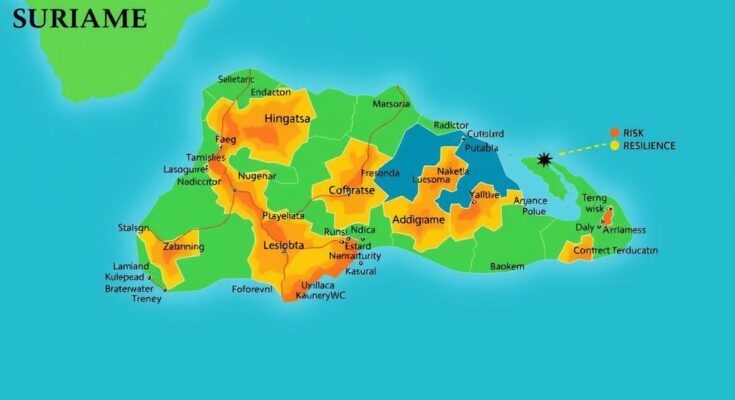The Suriname National Disaster Preparedness Baseline Assessment evaluates disaster management capabilities through a partnership with PDC and NCCR, focusing on the unique hazards faced by Suriname. The assessment includes two components: Risk and Vulnerability Assessment and Disaster Management Analysis, leading to strategic recommendations for improving resilience and implementing disaster reduction initiatives aligned with international frameworks. Despite advancements, the absence of a Disaster Management Law hinders progress, necessitating urgent action to address climate and disaster risks.
The Suriname National Disaster Preparedness Baseline Assessment (NDPBA) represents a collaborative initiative between the Pacific Disaster Center (PDC) and the Nationaal Coördinatiecentrum voor Rampenbeheersing (NCCR), supported by various stakeholders within the country. This assessment evaluates Suriname’s specific hazard profile, cultural context, geography, historical events, and other significant factors impacting its disaster management capabilities. The results contribute to strategic recommendations aligned with the United Nations Sustainable Development Goals and the Sendai Framework for Disaster Risk Reduction.
The assessment encompasses two main components: the Risk and Vulnerability Assessment (RVA) and the Disaster Management Analysis (DMA). The RVA analyzes multi-hazard risks, socio-economic vulnerabilities, and community coping capacities. Conversely, the DMA qualitatively examines six sub-themes: Enabling Environment, Institutional Arrangements, Disaster Governance Mechanisms, Capabilities and Resources, Capacity Development, and Communication and Information Management. The results from the DMA provide contextual insights that enhance the findings of the RVA, culminating in recommendations and a five-year action plan for disaster risk reduction.
The findings from the RVA reveal Suriname’s vulnerability to numerous hazards, including extreme heat, flooding, diseases from mosquitoes, and earthquakes that pose substantial risks to people and infrastructure. Identifying these vulnerabilities and enhancing coping strategies is crucial for effective disaster management. Addressing challenges related to education, population density, and economic obstacles can significantly mitigate risks, while improving public health and access to energy can enhance the country’s disaster response capabilities.
Suriname has made notable advancements in disaster management, primarily focusing on risk reduction and aligning with international standards through collaborative efforts. The Multi-Annual Development Plan (2022-2026) prioritizes minimizing disaster impacts on vulnerable populations, supported by the Environmental Framework Act (2020), which establishes a National Environmental Authority to enhance climate resilience and infrastructure. Nevertheless, the lack of an approved Disaster Management Law obstructs NCCR’s effectiveness in delineating responsibilities and resources essential for improving disaster preparedness and response.
As the risks posed by climate change increase, the necessity for a national climate and disaster risk financing strategy becomes apparent. Implementing the recommendations outlined in this report is vital for enhancing Suriname’s disaster preparedness and management capabilities. The NDPBA was funded by the United States Government through the US Southern Command and executed in collaboration with the U.S. Embassy in Suriname, with support from various governmental and non-governmental partners. Comprehensive details about the project partners can be found in the full report. To access the analysis findings, including recommendations and data, visit PDC’s DisasterAWARE Pro® application for disaster managers and humanitarian personnel.
In summary, the Suriname National Disaster Preparedness Baseline Assessment underscores the importance of tailored strategies for improving disaster management in the country, particularly in light of its vulnerabilities to multiple hazards. By employing a data-driven approach and fostering collaborations, Suriname aims to enhance its resilience through effective disaster risk reduction and resource allocation. Addressing legal and institutional barriers will further bolster the nation’s readiness against future disasters.
Original Source: reliefweb.int




